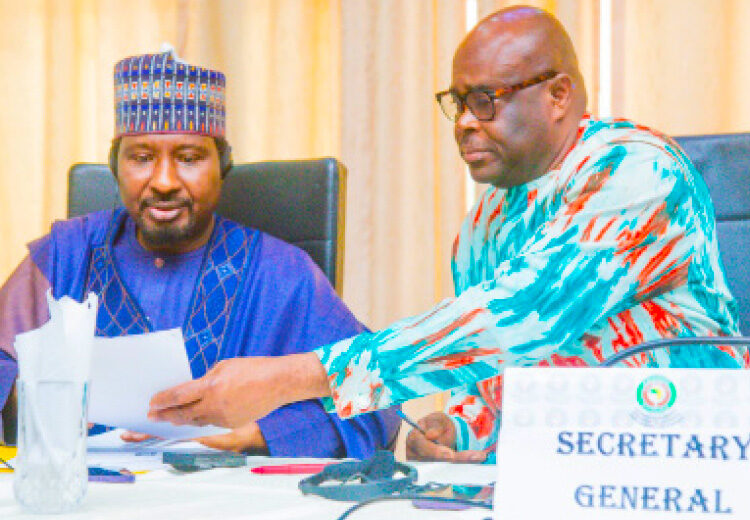The 6th Legislature of the Economic Community of West African States (ECOWAS Parliament) was inaugurated on Thursday to chart a new legislative agenda for the regional bloc in the next four years amid efforts to promote regional integration.
The Nigerian President, Bola Ahmed Tinubu, who is also the Chair of the ECOWAS Authority of Heads of State and Government of ECOWAS administered the oath of office to the new Members of Parliament in accordance with Article 28 of the Supplementary Act on the Enhancement of Powers of the regional legislature in a ceremony which was held in Abuja on Thursday.
In his remarks the Nigerian leader said “I wish to reaffirm an unwavering commitment to the aspirations of the community and by extension the fundamental objectives for which the ECOWAS Parliament was established.”
President Tinubu appealed to the new Legislature to work for unity, for opportunity and prosperity of the sub region.
However, an unprecedented event took place that required extraordinary measures to streamline proceedings when the Parliament could not elect a substantive Speaker as required by the Supplementary Act.
The regional legislature was unable to elect a substantive Speaker following the inability of Togo to which the position was zoned, to produce the leader of the Parliament due to the political situation in the country, which caused the Parliament to invoke the “Doctrine of Necessity” to elect other principal officers pending when the Speaker emerges from Togo.
During the session, Deputy President of the Nigerian Senate, Jibrin Barau was elected 1st Deputy Speaker of the Parliament. Barau was nominated by Nigerian Member of Parliament, Awaji- Inombek Dagomie Abiante, in a session presided by Liberia’s Edwin Snowe as Speaker Pro – Tempore. His nomination was seconded by another Nigerian Member of Parliament, Senator Ireti Kingibe and he was voted unopposed.
The office of the 1st Deputy Speaker of the ECOWAS Parliament is usually reserved for Nigeria anytime the country is not presiding as Speaker of the Parliament.
Also elected as Second Deputy Speaker was Adjaratou Traore Coulibally from Cote d’Ivoire, who polled 54 votes to beat Cecile Ahoumnon from Benin, who got zero votes.
The position of the Third Deputy Speaker was won by Alexander Kwamena Afenyo- Markin from Ghana in a unanimous vote.
The Fourth Deputy Speaker position was won by Billay Tunkara from The Gambia with 47 votes beating Orlando Pereira Dias from Cabo Verde who got 7 votes.
Speaking to reporters on Saturday at the close of the Inaugural Session, Senator Jibrin Barau, explained the wisdom and the processes that led to the election of the Four Honourable Deputy Speakers through the Doctrine of Necessity.
He said “The application of the Doctrine of Necessity was necessary to restore order to this house and uphold the sanctity of our cherished institution. I thank the Bureau of Age and the Honourable Speaker Pro-Tempore for exercising leadership and thank all the Honourable Members for supporting the process to the fullest. The action taken by this Parliament marks the beginning of what I foresee to be a united Parliament that speaks with one voice in the interest of our community.”
Part of the resolutions reached was the selection committee, which worked hard to establish fourteen standing committees that are concise and balanced in language, gender, and nationality. There was also the Committee on Drafting the Rules of Procedure of the Sixth Legislature, which will guide and guard the House in the new dispensation.
Senator Barau, who is also the Acting Speaker, noted that although the responsibilities are heavy, he urged his colleagues to remain totally faithful to their commitments. “That’s why we need to work together with intelligence, rigour, and determination to meet the major challenges that lie ahead,” he added.
ECOWAS as a regional body has had some serious challenges facing member states, which threatened the bloc with disintegration when three of its members, Burkina Faso, Mali and Niger in January announced their decisions to quit the community. This was due to disagreements with ECOWAS over military coups in the three countries.
President of the ECOWAS Commission, Dr. Omar Touray in his remarks, decried the pulling out of the three countries and warned about the consequences of the decision of the three countries on their citizens, especially in ECOWAS institutions and advised them to reconsider their decision. This is especially after the regional bloc had lifted the sanctions imposed on the three countries.
The new Legislature appears to have shown purpose and direction from the stated objectives of the new leaders and their passion to initiate legislative process and mechanism that will reshape the political and economic situation and boost the integration process in the region.
However, the legislature must find ways of strengthening democracy in the region not only through periodic elections but by accountability of government in order to realize the ECOWAS Vision of 2050, which requires involvement of the people in the decision making process of the region.
It is also important to work arduously towards realizing the much touted Direct Election into the regional Parliament, as well as take steps to address the issues of insecurity and poverty, low investment and poor infrastructure in the region.
The task before the new parliament is enormous and how the new legislators will respond to it remains within the bowels of time.
The ECOWAS Parliament, also known as the Community Parliament, is one of the Institutions of ECOWAS. It is the Assembly of Peoples of the Community serving as a forum for dialogue, consultation and consensus for Representatives of the people of West Africa with the aim of promoting integration.
The Parliament is composed of 115 seats. Each Member State is allotted a guaranteed minimum of five seats. The remaining forty seats are distributed in proportion to the population of each country.
We’ve got the edge. Get real-time reports, breaking scoops, and exclusive angles delivered straight to your phone. Don’t settle for stale news. Join LEADERSHIP NEWS on WhatsApp for 24/7 updates →
Join Our WhatsApp Channel










